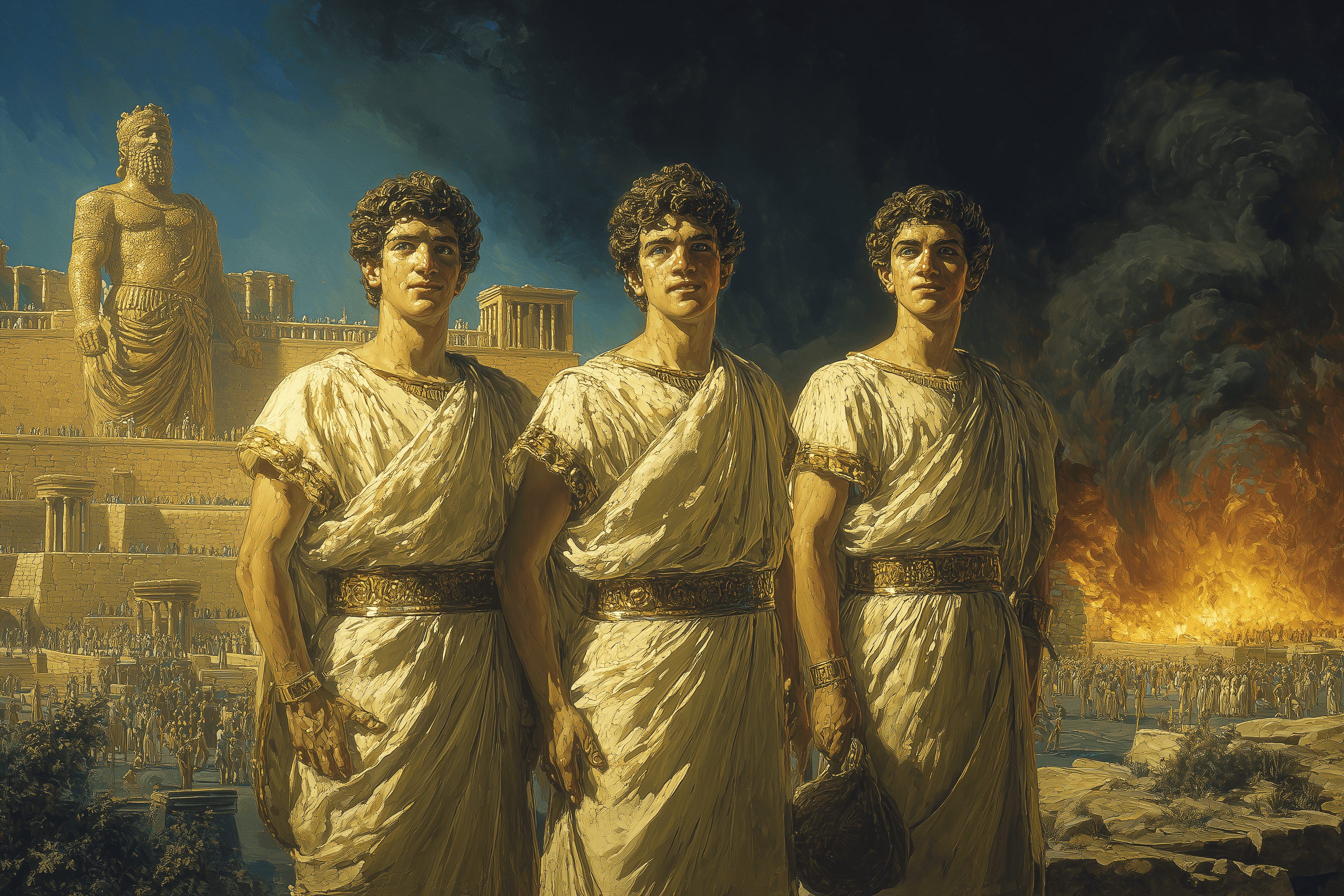
The Three Men
In the wide, sun-baked plain of Dura, beneath a dazzling Babylonian sky, a towering statue of gold shimmered brilliantly in the relentless heat. Built by order of the mighty King Nebuchadnezzar himself, the statue rose an impressive sixty cubits—tall enough to inspire awe and fear among the multitude who had gathered beneath its shadow.
Among the officials, nobles, and commoners summoned from every corner of Nebuchadnezzar’s vast empire stood three young Hebrew men named Shadrach, Meshach, and Abednego. They had been taken from their homeland of Judah, trained in Babylonian wisdom, and granted high positions in the king’s court. But despite all their success, they had never forgotten the God of their fathers. This God—the one true God—had commanded clearly: "You shall have no other gods before me."
At the sound of trumpets, lyres, flutes, harps, and pipes, everyone in the plain was ordered to fall down and worship Nebuchadnezzar’s glittering idol. Those who refused would immediately face a fiery death, hurled into a blazing furnace. As the herald’s voice thundered this threat across the plain, all around them fell prostrate. A great ripple moved outward, leaving only Shadrach, Meshach, and Abednego standing upright, alone and exposed.
Their quiet courage was soon noticed. Jealous astrologers hurried to the king with accusations: "O King, three Hebrews whom you appointed defy your decree! They refuse to worship your golden image."
Nebuchadnezzar, his face red with fury, summoned the three young men. "Is it true," he demanded, his voice dangerously calm, "that you will not serve my gods or worship the image I have set up? Perhaps you misunderstood. When the music sounds again, bow down. If not, you will be thrown into the furnace, and no god can rescue you from my hand."
Shadrach stepped forward, his voice steady, eyes clear. "O King Nebuchadnezzar, we need not defend ourselves. If we are thrown into the blazing furnace, the God we serve is able to save us from your hand. But even if He does not, we will never serve your gods or worship the idol of gold."
Nebuchadnezzar’s eyes burned brighter than the furnace itself. "Make the flames seven times hotter!" he roared, signaling his strongest warriors to bind the three youths tightly. As they approached the furnace—now roaring fiercely, the heat overwhelming—the soldiers themselves fell lifeless, overcome by the scorching blast. Yet the three Hebrews, bound tight, tumbled into the fiery heart unharmed.
Nebuchadnezzar rose from his throne, eyes wide, mouth agape, astonishment gripping him. Peering into the furnace, through the rippling heat and roaring flames, he saw something impossible.
"Weren't there three men we cast into the fire?" he shouted to his officials.
"Certainly, O King," they replied, confused by his alarm.
"But look!" Nebuchadnezzar cried out, pointing with trembling hand. "I see four men walking freely, unharmed, and the fourth looks like a son of the gods!"
All the gathered multitude pressed forward, straining to see. The impossible was unfolding before them—four figures moved about calmly within the flames, untouched and unafraid.
Shaking, Nebuchadnezzar approached the edge of the furnace, calling out desperately, "Shadrach, Meshach, Abednego, servants of the Most High God—come out! Come here!"
From the blaze stepped the three young men. Their robes were untouched; not a hair of their heads was singed, nor even the faintest scent of smoke clung to them. They emerged as calmly as if walking through a garden.
The king fell silent, awed and humbled. His face softened, and tears filled his eyes. "Praise be to the God of Shadrach, Meshach, and Abednego," he declared. "He has sent His angel and rescued His servants who trusted in Him. They defied my command, willing to give up their lives rather than serve or worship any god but their own."
Turning toward the stunned crowd, the king’s voice rang clear and strong. "Therefore, I decree that the people of any nation who speak against the God of Shadrach, Meshach, and Abednego will be severely punished, for no other god can save in this way!"
The crowd, amazed, parted slowly, murmuring their astonishment as the three youths returned peacefully to their homes, faces glowing with a quiet joy and courage born of unshakable faith.
Days later, life in Babylon resumed. The golden statue still stood proudly beneath the vast sky, but its power had faded like the sunset. The Babylonians whispered among themselves of the God who turned flames into paths of freedom, who stood with His faithful servants even in the heart of fire.
And Shadrach, Meshach, and Abednego continued to serve faithfully in the king’s court, their integrity untouched, their courage fortified, their faith proven true.
True courage means standing firm in faith, even when the world around you bows down.